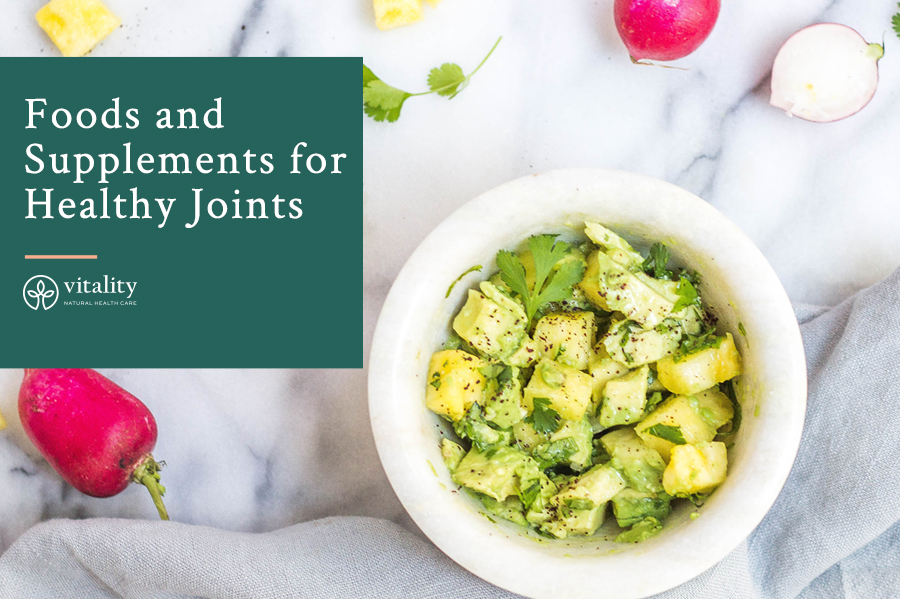This is the third blog post in a series of four about joint health and arthritis. So far I’ve shared information about the different types of arthritis and joint disorders and provided seven things that you can incorporate into your daily routine to maintain the health of your joints and reduce your risk of developing arthritis. However, there is more to prevention than lifestyle choices. The food you eat and the supplements you take also play an important role in the prevention of arthritis and maintenance of healthy joints.
Here are six dietary recommendations that I make when treating patients with joint pain and arthritis:
Minimize Refined Sugar and Alcohol Consumption
Refined sugar and alcohol create an acidic environment inside your body which increases internal inflammation. Instead of reaching for cakes, cookies, cereals, and other packaged foods, choose fresh fruit. Also, it’s also best to avoid artificial sweeteners and chemical food coloring as they are also acidic and encourage joint decay. When you need to add sweetener to a food or beverage, choose stevia or honey.
Increase Collagen Intake
Collagen is rich in amino acids and plays an important role in the building and maintenance of joint cartilage. A great way to incorporate more collagen into your diet is by eating bone broth as it is one of the best natural sources of collagen. It also contains proline and glycine, amino acids that help rebuild connective tissue. Here’s a great recipe, if you want to make it yourself. You can also buy it as a powder and add it to soups and smoothies.
Add Healthy Fats to Your Diet
Healthy fats, like the omega-3s found in wild caught salmon, help to decrease the inflammation that contributes to joint pain and swelling. In addition to wild caught salmon, you can get a healthy dose of healthy fats from grass-fed beef, avocado, flax seeds, chia seeds, olives, olive oil, and walnuts.
Eat More Green Veggies
Green leafy vegetables like spinach, kale, swiss chard, arugula, and collard greens help create an alkaline environment inside your body, making it harder for diseases to thrive. Green vegetables also help to reduce inflammation. For the best results, try to incorporate 2-3 cups of green vegetables at each meal.
Spice Up Your Meals
In addition to green leafy vegetables and healthy fats, it’s also beneficial to add spices like cayenne pepper, ginger, and turmeric to your food. Cayenne contains capsaicin which can help reduce nerve and muscle pain. Ginger, according to Chinese medicine, is a warming spice. Its warmth helps to increase circulation and reduce inflammation. Similarly, turmeric contains curcumin which also helps to reduce inflammation. You can add these spices to non-dairy milk to make an anti-inflammatory beverage, or use them to flavor organic chicken or wild caught fish.
Quit Smoking
Smoking negatively affects several aspects of your health, including your joints, bones, and connective tissue. A study conducted in 2007 by the Mayo Clinic followed 150 men with osteoarthritis for 30 months and found that smokers experienced more severe pain and were twice as likely to have significant cartilage loss than non-smokers. The researchers in this study speculated that the cartilage loss occurred due to high levels of carbon monoxide and other toxins in the blood of smokers (1)
Unfortunately, it’s not always possible to get all of the nutrients we need from the food we eat. In these instances, supplementation may be necessary. Here are some of the supplements I recommend for healthy joints:
Turmeric
In addition to adding it to your food, you can supplement with a more concentrated form of this anti-inflammatory spice. If you are planning to go this route, be sure to choose a turmeric supplement, like this one, that also contains black pepper. This will help with absorption.
Fish Oil
Wild caught salmon is a great way to get the healthy fats you need to reduce inflammation and joint pain. You can also get Omega-3s, EPA, and DHA through supplementation. When choosing a fish oil, look for a high-quality variety that is water soluble.
Hyaluronic acid
Healthy joints contain a thick substance called synovial fluid. This fluid provides lubrication which allows the bones to glide against each other, without rubbing together. It also acts as a shock absorber. Hyaluronic acid is a critical component of synovial fluid. However, in individuals with osteoarthritis, it is not present in adequate amounts. This loss of hyaluronic acid contributes to joint pain and stiffness. To counteract this loss, you can take hyaluronic acid in supplement form or get it through injections under the care of your healthcare provider.
Glucosamine and Chondroitin
Glucosamine is found in the cartilage of your joints and acts as a natural shock absorber and joint lubricant while chondroitin helps to rebuild cartilage after normal wear and tear or injury. These two substances are often used together to help stimulate the production of new cartilage as well as reduce inflammation and joint pain. The glucosamine and chondroitin supplement I recommend most frequently to patients experiencing joint pain is Arthritis Support. It contains glucosamine and chondroitin, as well as hyaluronic acid and turmeric, all of which possess anti-inflammatory properties and can support the health and recovery of your joints.
Arthritis and joint diseases are preventable with proper care and keeping of your body.
If you are at risk of developing arthritis or are experiencing joint pain, take the necessary steps to modify your food and lifestyle choices.
Making these changes and incorporating one or more of the therapies that I’ll share with you in the final blog post of this series can help you maintain healthy joints and reduce the likelihood that you will develop arthritis. It can also help to reduce your symptoms if you’ve already been diagnosed.
xo,

*Important note: while all of the nutrients above are safe, it’s important to get the advice of a well-trained naturopath or herbalist, as there are contraindications if you have existing medical conditions or are pregnant. Please seek the advice of a qualified practitioner before beginning any supplements on your own.


1 reply on “Foods and Supplements for Healthy Joints”
Thank you for making this information available. This article is really informative and educative.